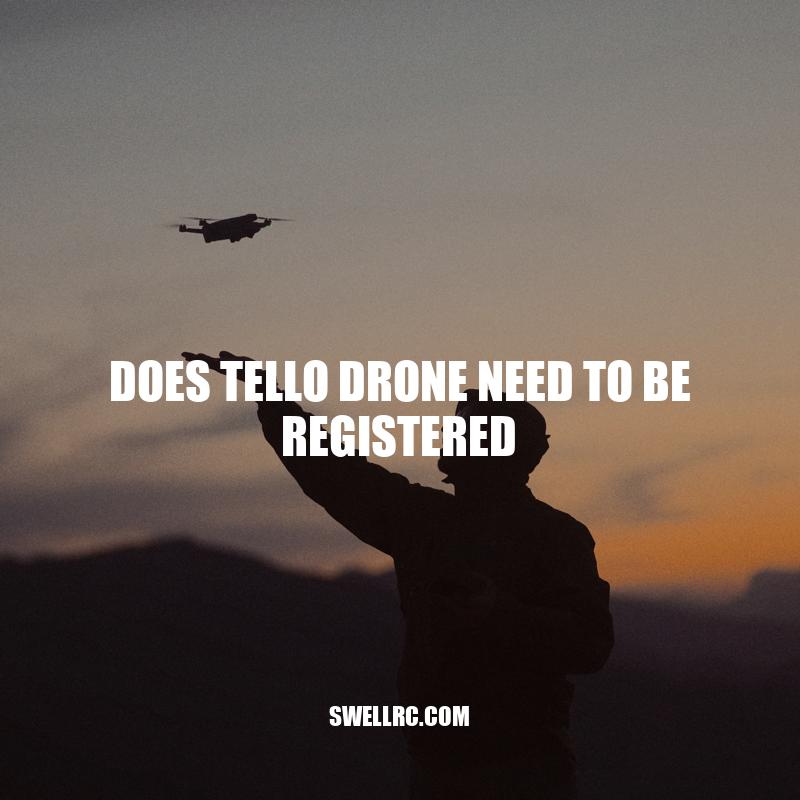Does Tello Drone Need FAA Registration?
The Tello drone is a popular entry-level drone that has captured the attention of drone enthusiasts and novices alike. Its compact size, high-quality camera, and affordable price tag make it an ideal choice for those who are looking to explore the world of drones without breaking the bank. But, with the Federal Aviation Administration (FAA) regulations in place for drones in the US, the question often arises – does the Tello drone need to be registered?
Before we answer that question, let’s take a closer look at what the Tello drone is and what makes it so appealing. The Tello drone is manufactured by Ryze Tech and powered by DJI technology. It measures just under four inches and weighs a mere 80 grams. Despite its small size, it packs quite a punch, as it boasts an Intel processor, an HD camera, and a range of up to 100 meters. In addition, it has a flight time of up to 13 minutes, which is impressive considering its size. The Tello drone is designed to be easy to use and is the perfect introductory drone for young or new pilots. It also comes with a range of pre-programmed stunts and maneuvers, which will delight anyone who enjoys getting creative with their drone.
Now, back to the question at hand – does the Tello drone need to be registered with the FAA? To answer this question, we need to consider the FAA guidelines applicable to drones in the US.
FAA Regulations and Drone Registration
According to the FAA, all drones weighing over 0.55 pounds (250g) must be registered with the agency. This includes both recreational and commercial drones. Failure to register your drone can result in fines and other legal consequences. When registering a drone, the FAA provides you with a unique identification number that must be visibly displayed on the drone. This helps to identify the drone and its owner in case of any accidents or incidents.
Does the Tello Drone Need to be Registered?
Fortunately, the Tello drone is exempt from FAA registration, as it weighs less than the threshold weight of 250g. This means that you can purchase and fly the Tello drone without registering it with the FAA. However, if you plan to use your drone for commercial purposes or in restricted airspace, you may still need to obtain a Part 107 Remote Pilot Certification from the FAA.
Benefits of Registering Your Drone
Although the Tello drone does not require FAA registration, it is still worth considering registering your drone with the FAA. Some benefits of registering your drone include:
- Legal Compliance: Registering your drone ensures that you are in compliance with FAA regulations.
- Identification: The FAA identification number provides accountability and helps to locate the owner in the case of any incidents.
- Warranties: Some drone manufacturers offer extended warranties or discounts to registered drone owners.
Overall, although registration is not required for the Tello drone, it is still a good idea to consider registering your drone with the FAA to ensure legal compliance and accountability.
What is the best drone that doesn’t require FAA registration?
If you’re looking for a drone that doesn’t require registering it with the Federal Aviation Administration (FAA) in the US, you’ll want to find one that weighs less than 0.55 pounds. Here are some of the top options:
- Hubsan H107D+
- Cheerson CX-10C
- Syma X5C-1
- UDI U818A
These drones are all under the weight limit and offer great features for their price point. However, always make sure to check the drone’s weight and local regulations before purchasing and flying it.
Do You Need a Part 107 Certification to Fly the Tello Drone?
The Tello drone is a great option for those looking to fly a drone recreationally or for simple photography and videography. However, if you plan to use your Tello drone for commercial purposes or in a professional setting, you may need to obtain a Part 107 Remote Pilot Certification from the FAA. This certification is required for commercial drone pilots and involves a written exam and a flying test. Some points to keep in mind include:
- The Part 107 certification is required if you plan to use your Tello drone to make money or offer services to others.
- Commercial uses of the Tello drone could include aerial photography, videography, or surveying.
- The certification requires passing a written exam and a flying test.
Part 107 Certification Exam Content
The Part 107 certification exam covers a range of topics related to drone operation and safety. According to the FAA, some of the topics covered include:
| Topic | Approximate Number of Questions on Exam |
|---|---|
| Regulations | 15-25 |
| Airspace and Requirements | 15-25 |
| Weather | 11-16 |
| Drone Loading and Performance | 7-11 |
| Emergency Procedures | 5-10 |
Overall, while the Tello drone does not require FAA registration for recreational use, obtaining a Part 107 Remote Pilot Certification is important if you plan to use your Tello drone for commercial purposes. The certification process involves passing a written exam and a flying test, covering topics such as regulations, airspace and requirements, weather, and emergency procedures.
What can you use to fly a Tello drone?
There are four main ways to fly a Tello drone:
- Using the Tello app on your smartphone or tablet
- Using a compatible Bluetooth controller
- Using TelloFPV app for advanced flying modes
- Using programming platforms like Scratch for Tello and Tello SDK
It’s important to note that the Tello drone connects to your device via Wi-Fi, so make sure you have a stable connection before taking off. You can purchase a Tello drone and accessories directly from DJI’s website.
Benefits of Obtaining a Part 107 Certification
Obtaining a Part 107 Remote Pilot Certification isn’t just a requirement for commercial pilots; it also comes with a number of benefits. Here are a few reasons to consider obtaining your Part 107 certification:
Expand Your Business Opportunities
If you plan to fly your Tello drone for commercial purposes, obtaining your Part 107 certification is necessary to expand the kinds of services you can offer. With a certification, you are able to offer videography, photography, and other drone-based services to a wider range of clients, ultimately helping you grow your business.
Enhance Your Credibility
Having a Part 107 certification enhances your credibility and sets you apart from non-certified drone operators. Certification demonstrates to potential clients that you have knowledge and expertise in the industry and are committed to safe drone operation.
Operate in Restricted Areas
With a Part 107 certification, you are legally allowed to fly your Tello drone in restricted airspace, such as near airports or other areas where drone flight might otherwise be prohibited.
Conclusion
In conclusion, while the Tello drone does not need to be registered with the FAA for recreational use, obtaining a Part 107 Remote Pilot Certification is a smart move if you plan to fly your Tello drone commercially. It expands your business opportunities, enhances your credibility as a drone operator, and enables you to fly your drone in restricted areas. With a bit of preparation and some studying, obtaining your Part 107 certification is manageable and can ultimately be a valuable investment in your drone operation career.



